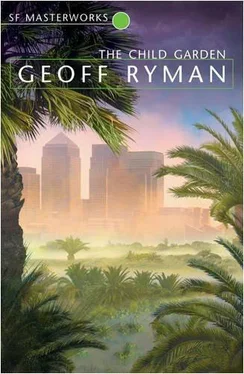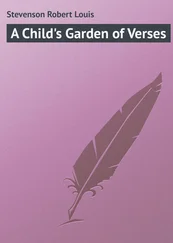‘Let’s…’ Rolfa paused to belch. ‘…go have a good time.’ The smile was a snarl. She spun off, into the night.
I don’t like this, thought Milena and followed, full of misgiving.
They went to another horrible pub across the river. The Comedy Restaurant said art-nouveau lettering on tiles outside it. There seemed to be no one there who Rolfa knew. She rolled her way like a millstone towards the bar, through the men who stopped laughing as she passed, towering over them, jostling them. The men looked small and hard and weasly. The place was as disordered as anything in Britain ever got. The plaster walls were bulging and cracked and stained in streaks. There were harsh alcohol lamps that stank. Milena looked at Rolfa, at her back. Then she felt one of the weasels pressing up against her. He wore skimpy trunks and a sleeveless body-warmer that smelled of sweat and beer.
‘Bow wow,’ he said. His forehead glistened with sweat. He’s got a virus, Milena thought. But which one?
‘You like dogs?’ he asked.
‘No. I don’t like dogs,’ said Milena warily, meaning that she did not like him. He had friends all around them, and they were all sweating. Some of them shook with fever.
Milena did not have time to consider what disease it was they had.
There was a flurry, a scattering nearby, and Milena turned to see Rolfa wading towards her, towards them, her shoulder shrugging from side to side, and Milena thought: she’s going to hit one of them.
That’s what she thought until Rolfa picked up a table. Not a large table, but a small, light one made of bamboo. Mugs rolled off it, beer fell in a gush, men shouted protest, and the table rose up, hit a lamp, and broke it.
Along the very edge of her teeth, Milena seemed to feel something, the thing that made Rolfa rot her own teeth to nothing, and she held up her hands and shouted, ‘Rolfa! Stop!’
Rolfa paused, blearily staring.
‘Rolfa! Nothing happened.’ Rolfa blinked, looked sheepish, defeated, confused.
‘Put the table down, Rolfa,’ said Milena.
Or you’ll kill someone.
‘Just put it down. Please? Nothing happened.’
The table was very gently lowered. Rolfa patted it, as if telling it she was sorry.
Milena pushed her way between the men, and took Rolfa’s arm and pulled. ‘Come on, Rolfa. Come on.’ And Rolfa followed, tamely, out into the night again. The barman followed.
‘What about the light?’ he shouted.
‘Don’t push!’ pleaded Milena, holding up her hands, and something in her voice convinced him.
Rolfa threw off her hand and walked towards the river. Milena called after her. She ran, to catch up, but Rolfa did not turn around or answer. She marched, with long lunging strides. It was dark, there were no lights, and Milena suddenly found she was alone with only just sufficient idea of where she was to find the river again, and the Shell.
Well, she thought forlornly. Well. That’s that. Something, she knew, had finished.
At one o’clock the next afternoon, she went to the steps and Rolfa was not there.
At six o’clock, she and Jacob went to the Graveyard and there was only silence. They waited hidden like mice for the singing to begin. The darkness deepened. Finally they edged their way towards the desk, and peeked out between the costumes.
Papers had been torn or crushed into balls. The musical scores had been ripped in half along their bindings and the pages had been scattered. The electronic device was in a corner; its panel was broken open; wafers were all over the floor; their resin tray was cracked and splintered; book covers had no pages in them.
Milena knelt and picked up what was left of the Wagner notebook. She tried to put its crinkly pages back in order and found spit between them. She wiped her cheeks and gathered up the things.
‘Jacob,’ she said, her voice going thin. ‘Help me back with all of this?’
They piled up the musical scores, and the wafers and carried them back like the honoured dead to Milena’s room at the Shell. ‘Tell her I have them. Tell her she can have them back when she wants them,’ Milena said to Jacob.
And she went to bed, wondering at the maze of rooms that was someone else’s life. She read the score of Das Lied von der Erde.
The last movement told a kind of ghost story. Two old friends meet and one speaks mysteriously of life in the past tense, of finding a resting place. He seems to move on, into eternity, the bright and shining blue. The friend has chosen to leave.
Milena imagined the music. It was not about death. It was about the beauty of the world as it is lived in, and the sadness of having to leave it. It was about the sadness of losing friends, and the necessity of it. Milena remembered Rolfa’s voice singing ewig… ewig. Forever.
The music was hers now. She had learned it. Milena was left at the end hugging the cream paper as if it were skin. She was holding a ghost, an abstraction of what might have been, a possibility.
That night she dreamt of musk ox, running on the tundra. One of them was calling like a seagull.
In the morning, Milena was shaken awake by Jacob.
‘Ms Sibush! Ms Shibush! Oh, look what I have for you!’ he exclaimed, smiling and excited. Then he whispered, ‘from Ms Patel.’ He passed her a fold of paper.
An envelope. It was as if something had been sent to her out of a previous century. Milena carefully lifted up the flap and pulled out a thick white card. It was edged in gold. Jacob waiting, smiling.
The card was engraved in beautifully flowing copperplate script.
‘Do you feel able to tell me what it says?’ Jacob asked her shyly.
‘It’s an invitation,’ said Milena. ‘For dinner at eight o’clock tomorrow evening.’ She passed him the card. ‘With Rolfa’s family.’
CHAPTER FOUR
Antarctica
(The Indigent Gloves)
The Bears of London lived together in one street in Kensington. It was a Nash terrace, painted cream, with black wooden doors.
Milena was too short to reach the door knocker. She tried jumping and missed and decided to avoid any further risk to her dignity. She pounded on the door with the heel of her hand.
There were shouts and thumpings and suddenly the door was thrown open by a naked Polar teenager. All her fur the length of her body was in braids. There was a blast of icy air from inside. The girl took one hardened look at Milena and yelled. ‘Rolf-a! Your little friend’s here.’ Then she walked away, leaving the door open.
It was bitterly cold inside. All the walls between the houses had been knocked down to make one enormous, barren room that ran the length of the street. A large male GE in a metal mask was squatting over a machine, welding a join. Milena had time to notice that the floor was covered in fur.
‘Shut the door!’ the Polar girl shouted. There was angry thumping, the girl stalked past Milena and flung the door shut. ‘It makes our hair fall out, you little Squidge,’ she snarled. ‘Rolfa! Slump your fat tush down here!’
The room was full of unopened bamboo packing cases. Polar teenagers lounged on them, watching a screen. It was video! It was showing an old movie! Milena couldn’t help but stare in wonder. There was a flash and a mechanical scream, and Milena saw someone torn to pieces before her very eyes. Why on earth, she wondered, have a video and men use it to see something like that?
‘What are you staring at?’ said another GE, a boy, his voice cracking on the edge of puberty like an egg.
‘Nothing,’ said Milena.
‘She’s never seen a video,’ said the girl and rolled her eyes. Some of the Bears were grooming each other, brushing their pelts or braiding them. It was their moulting season, too hot to go outside. They were sullen and dangerous with boredom. Milena hugged herself and tried to stand her emotional ground, but she was still feeling sick from having seen a human being rent into stringy chunks. She began to shiver from the cold. That’s frost, she saw in dismay, that’s frost on the inside of the windows.
Читать дальше












